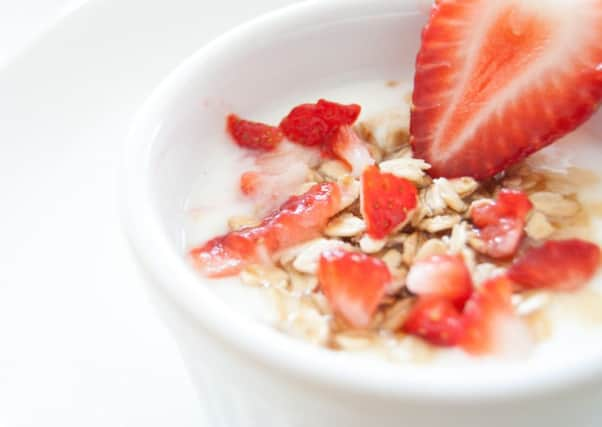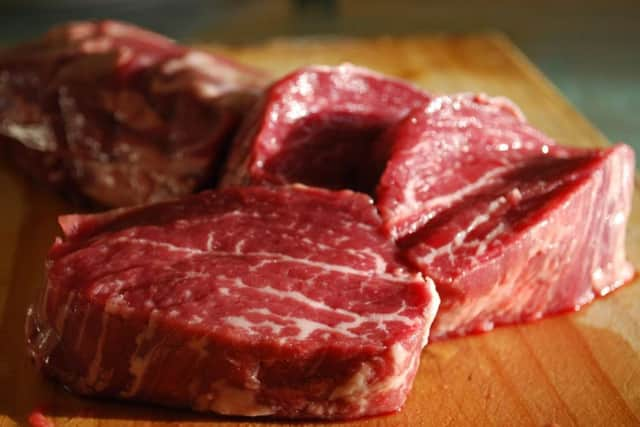Healthy eating can improve chances of avoiding cancer


Because certain cancers can take a prolonged period to develop, it’s difficult to pinpoint which foods have a direct effect on the development of the disease - but research shows that there is a link between certain food groups and a reduction in cancer risk.
Jane Tobias, a nutrition lecturer at the University of the West of Scotland, explained there are some simple steps everyone can take to improve their diet.
Cut down to 70g or less red or processed meat a day


Advertisement
Hide AdAdvertisement
Hide AdConsuming large quantities of red and processed meat can leave you at bigger risk of developing bowel cancer and possibly stomach and pancreatic cancer. White meat, such as chicken, is unlikely to increase the risk of developing the disease.
Although meat is a good source of protein, vitamins and minerals, evidence suggests that there are dangers with eating too much. It’s thought that the chemicals found in the products are responsible for increasing the risk of developing cancer. Some of the chemicals are natural while others are made when the meat is preserved or cooked at high temperatures.
Tobias said: “Fresh fish and meat poultry should be organically sourced, but I would suggest reducing red meats as they are often fed with hormones for growth and they are pro-inflammatory, which is not ideal for reducing free radicals.”
It’s advised that if you eat more than 90g of red or processed meat a day, you should cut down to 70g.


The best way to prevent bowel cancer is by keeping your diet rich in fibre to keep bowel moving and healthy. Foods such as wholegrain pasta, bread, breakfast cereals and rice are recommended as good sources of fibre.
Eat more fruits and vegetables
According to Cancer Research UK, one in 20 cancers in the UK may be linked to diets low in fruit and vegetables. Adding more of the two into your diet can drastically improve your health. Not only are they a source of antioxidants like vitamin C, vitamin E and selenium, they can protect against cancer and help your body function to the best of its ability.
“Generally the best recommendation for healthy eating is to eat a wide range of fruit and vegetables”, Tobias added. “Especially the red, purple and orange ones, which contain antioxidants and flavonoids that reduced the levels of free radicals in the body.


“Eating organic sourced foods will reduce toxins and locally grown where possible. Aim for a rainbow of colourful fruit and vegetables in the diet, these also contain natural probiotics and prebiotic fibres which can boost the immune system as well as support digestion.”
Advertisement
Hide AdAdvertisement
Hide AdDiets high in fruit can lower the risk of stomach and lung cancer while diets high in non-starchy vegetables like broccoli and spinach, can protect against stomach and esophageal cancer. Oranges, berries, peas and dark leafy greens are also beneficial in reducing esophageal cancer. Foods high in lycopene like tomatoes, guava and watermelon may lower the risk of prostate cancer.
Use less salt
The dangers of using too much salt have been in circulation for many years in reports which link over using to high blood pressure, strokes and premature deaths. Consuming excess amounts of salt has also been linked with a higher risk of stomach cancer by damaging the stomach lining which causes inflammation or making the stomach lining more sensitive to cancer-causing chemicals.


Dairy
“Dairy foods (milk, cheese, cream) are pro-inflammatory so reducing or finding alternative versions from, say, soya may be better and have other health benefits”, Tobias said. “Organic and natural yogurts contain probiotics so it’s good to include these for the immune boosting properties and digestive benefits.”
Drink more water
If you’re eating good amounts of fibre, it’s necessary to drink more water as it will be absorbed more readily. In fighting cancer, it also stimulates the immune system and removes waste and toxins, as well as transporting nutrients to your organs.
“Keeping processed foods (high sugar especially) to a minimum and read the labels, if you don’t understand what an ingredient is, chances are your body won’t either!”, Tobias commented.
“A good rule of thumb I use is the 80:20 rule, for 80 per cent of the diet have raw or freshly cooked foods and the other 20 per cent have a little indulgence. Even high cocoa chocolate is good for you as it contains flavonoid compounds.”